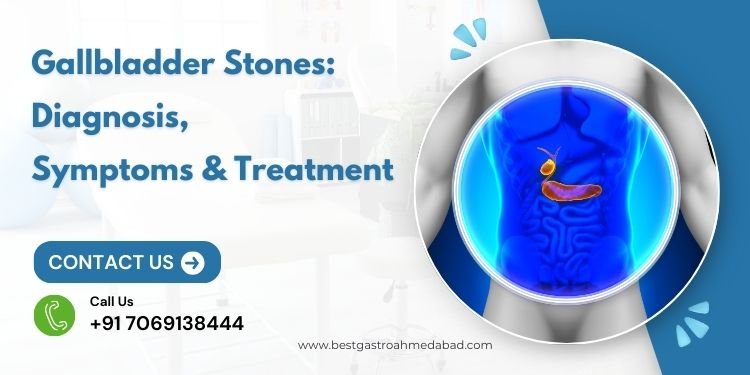Gallbladder Stones: What You Need to Know About Diagnosis and Care

Introduction:
Gallbladder stones, also known as gallstones, are hardened deposits of digestive fluid that can form in your gallbladder. They vary in size, ranging from tiny grains to larger stones, and can cause significant discomfort when blocking bile ducts. Understanding the symptoms, diagnosis, and treatment of gallbladder stones is crucial for managing the condition and preventing complications.
Dr. Vatsal Mehta, one of the leading gastroenterologists in Ahmedabad, specializes in diagnosing and treating gallbladder stones with a patient-centric approach. This article covers all you need to know about gallstones and the available care options.
What Are Gallbladder Stones?
Gallstones are crystallized masses of cholesterol or bilirubin that form in the gallbladder, a small organ that stores bile produced by the liver. Bile helps digest fats, but when its components are imbalanced, stones may form. There are two main types of gallstones:
- Cholesterol stones – the most common type, caused by excess cholesterol.
- Pigment stones – smaller, darker stones, formed from excess bilirubin.
Symptoms of Gallbladder Stones:
Gallbladder stones often go unnoticed unless they block a bile duct. When symptoms occur, they may include:
- Sudden and intense pain in the upper right abdomen
- Nausea or vomiting
- Pain in the back between the shoulder blades
- Jaundice (yellowing of the skin and eyes)
- Fever or chills if an infection occurs
If you experience any of these symptoms, it’s essential to seek medical advice from an expert like Dr. Vatsal Mehta.
Diagnosis of Gallbladder Stones:
Dr. Vatsal Mehta uses a range of diagnostic techniques to identify gallbladder stones, including:
- Ultrasound: A non-invasive imaging test that detects stones in the gallbladder.
- CT Scan: Provides detailed images of the gallbladder and surrounding areas.
- Blood Tests: To check for signs of infection or bile duct blockage.
- MRCP (Magnetic Resonance Cholangiopancreatography): A specialized MRI scan to assess bile ducts.
Treatment Options for Gallbladder Stones:
The treatment for gallstones depends on the severity of symptoms. Some common treatment options include:
- Watchful Waiting: If gallstones are small and asymptomatic, monitoring may be recommended.
- Medications: Certain medications can dissolve cholesterol stones over time, although this is less commonly used.
- Surgery (Cholecystectomy): The most effective treatment for symptomatic gallstones is the surgical removal of the gallbladder, known as cholecystectomy. This procedure can be performed laparoscopically (minimally invasive) and offers quick recovery.
- ERCP (Endoscopic Retrograde Cholangiopancreatography): For stones blocking bile ducts, this procedure can remove them without the need for major surgery.
Preventing Gallbladder Stones:
While some risk factors for gallstones, like age and genetics, are unavoidable, you can reduce your risk by:
- Maintaining a healthy weight and avoiding rapid weight loss
- Eating a balanced diet rich in fiber and healthy fats
- Staying physically active
- Managing chronic conditions like diabetes
Conclusion:
Gallbladder stones can cause significant discomfort and serious complications if untreated. Dr. Vatsal Mehta, a trusted gastroenterologist in Ahmedabad, provides comprehensive care to diagnose and treat gallstones effectively. If you’re experiencing any symptoms or have concerns about gallbladder health, scheduling a consultation with a specialist like Dr. Mehta is the first step towards relief and recovery.
